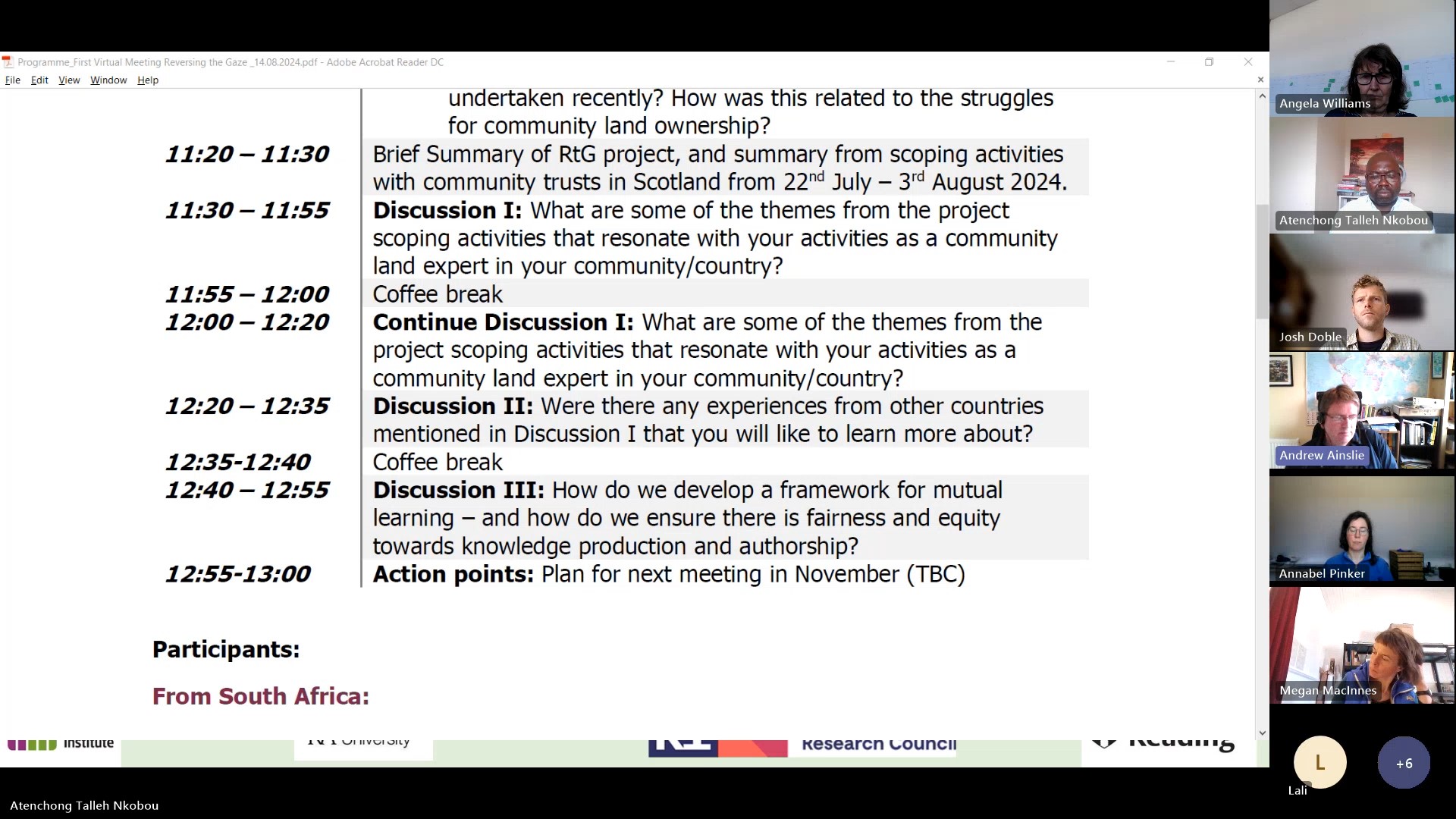First Virtual Meeting with Community Land Activists

Figure 5 Screenshot of programme during virtual meeting with community land activists
The first virtual meeting with 9 Community Land Activists from South Africa, Tanzania, and Scotland took place on the 14 August 2024 at 11:00am -1:00pm UK time. The aim of this meeting was to develop shared ownership of the Reversing the Gaze project, the project objectives, identify shared interests and also to develop a common framework for mutual learning. Various themes emerged from this first virtual meeting. These included:
- The use of community/indigenous land as the world’s playground: i.e., ‘Flamingo land’, ‘hunting and game reserves’. ‘…large strips of land on the shores of [Loch Lomond] that are being sold to an entertainment corporation which is called Flamingo Land. [They are] seeking to set up a kind of a big tourist development which the local community feel is not going to contribute to their economic and social development. It's also going to destroy a…beauty spot and contribute to even more tourism in an area which already has a lot of tourism….’ [JD - Scotland]
- Challenging the idea of ‘development’: – community land for ‘airport expansion’, ‘road expansion’, ‘land grab’ - ‘…development, which is not working with people, but it's kind of pre-organised; I think is a really important one and we see that a lot….’[JD – Scotland]
- Green finance, Carbon Credit, Greenbelt Biodiversity, Conservation: - These ‘green’ initiatives are now linked to land expropriation and land grab. ‘‘…it's quite difficult to argue because most of the time [carbon] offset, is about capital. That's how they just fool our people to say that we're going to put the money and hire you to plant those trees…’ [NF – South Africa]
- Challenges in Community Organising: – What do communities do with the land once you have the land? ‘…a lot of people, for various reasons, feel quite threatened by what the community itself has achieved in buying this land. Because it's…about change. And some people are very, uncomfortable with that. So, I suppose it's almost ironic in some ways. As an organisation, our struggle is to bring the community along with us…it's about working with those for whom this is very new and making sure that that they feel part of the process…’ [AW – Scotland]
- The political economy of ‘coalitions’, social movements and land alliances: ‘…the importance of community organising as a first step on this. Seeing community organising as the foundation stone, not just in terms of thinking about defining community, but about overcoming conflict, coming together with a vision and a future for the development of a particular piece of land. But also, communities being able to articulate and raise their voice and overcome the challenges of external groups who ignore community concerns. So, I think for me, community organising is, is key in when it comes to community land ownership…’ [MM - Scotland]
- The [political economy of] land questions/government actions/ legislation: - ‘…how to de-commodify the notion of land ownership and land use, but again, linking it all back to this bottom-up approach, to land reform and land redistribution and land use, bearing in mind to the whole issue of climate variability and climate justice…. [LN – South Africa]. ‘…we're not seeing effective government intervention to address this. And I think all of the issues we're seeing around Taymouth is a good example of that. And I think Scotland is now experiencing some of the challenges that community groups have faced across the world where land grabbing has been more of a direct impact on them. Even though we're not seeing the complete evictions that we see in other countries, we're still seeing the restriction of rights in law…’ [MM]
The next Virtual meeting will take place on the 29 October 2024. The aim of this second meeting will be to agree on an initial area of focus from the themes which emerged from the first virtual meeting. During this meeting we will also discuss authorship, participation and mutual learning in relation to our research and more public-facing outputs.